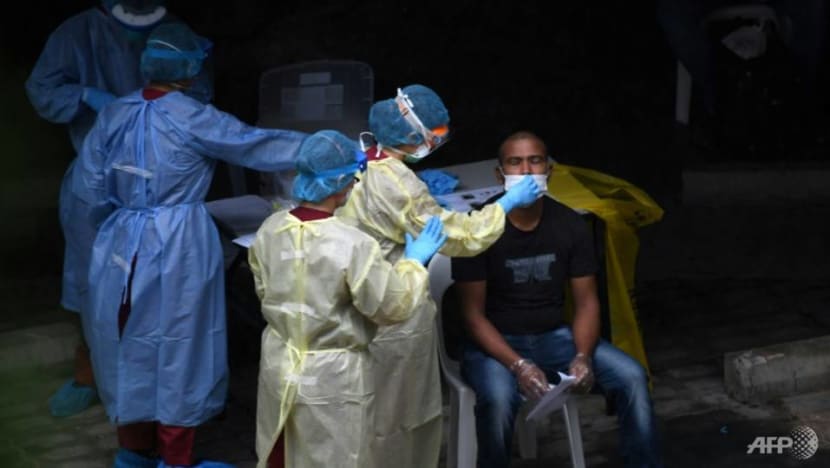No known case of COVID-19 reinfection in Singapore, says MOH

A healthcare worker collects a nasal swab sample from a migrant worker for testing for COVID-19 in Singapore. (Photo: AFP/Roslan RAHMAN)
SINGAPORE: There is "no known" case of COVID-19 reinfection in Singapore to date, and the Ministry of Health (MOH) is "actively investigating" the possibility of reinfection among those who have recovered from the disease.
Following reports of recovered COVID-19 cases in Hong Kong, Belgium and the Netherlands becoming reinfected with the coronavirus, an MOH spokesperson said on Thursday (Aug 27) that the ministry continues to review global and local clinical research and evidence on COVID-19 reinfection.
MOH will "monitor the situation closely", said the spokesperson in response to CNA queries.
“We have also been actively investigating the possibility of reinfection among persons who have recovered from COVID-19, when they seek subsequent medical care for acute respiratory infection symptoms," the spokesperson added.
On Monday, researchers at the University of Hong Kong said a Hong Kong man who recovered from COVID-19 was reinfected four-and-a-half months later.
It was the first documented instance of human reinfection. The 33-year-old man was cleared of COVID-19 and discharged from hospital in April, but tested positive again after returning from Spain via Britain on Aug 15.
READ: Hong Kong researchers report first documented COVID-19 reinfection
The patient had appeared to be previously healthy, researchers said in the paper, which was accepted by the international medical journal Clinical Infectious Diseases.
He was found to have contracted a different coronavirus strain from the one he had previously contracted and remained asymptomatic for the second infection.
The finding does not mean taking vaccines will be useless, Dr Kai-Wang To, one of the leading authors of the paper, told Reuters.
"Immunity induced by vaccination can be different from those induced by natural infection," he said. "(We) will need to wait for the results of the vaccine trials to see if how effective vaccines are."
World Health Organization (WHO) epidemiologist Maria Van Kerkhove said on Monday that there was no need to jump to any conclusions, in response to the Hong Kong case.
On Tuesday, a patient in the Netherlands and another in Belgium were confirmed to have been reinfected with the coronavirus, reported Dutch national broadcaster NOS, citing virologists.
NOS cited virologist Marion Koopmans as saying the Dutch patient was an older person with a weakened immune system.
She said that cases where people have been sick with the virus a long time, and it then flares up, are better known. But a true reinfection requires genetic testing of the virus in both the first and second infections to see whether the two instances of the virus differ slightly.
Koopmans, an adviser to the Dutch government, said reinfections had been expected.
"That someone would pop up with a reinfection, it doesn't make me nervous," she said. "We have to see whether it happens often."
READ: Dutch, Belgian patients reinfected with COVID-19 virus: Report
The Belgian patient had mild symptoms, NOS reported virologist Marc Van Ranst as saying. He said the case shows that antibodies the patient developed during the first exposure were not enough to prevent a second infection with a slightly different variant of the virus.
An infectious disease specialist in China's expert group for COVID-19 treatment, Wang Guiqiang, also offered several explanations about reinfection, as reported by Reuters.
One explanation was that the virus still existed in the lungs of patients but was not detected in samples taken from upper parts of the respiratory tract, he said. Other possible causes could include the low sensitivity of tests and weak immunity that could lead to persistent positive results.
BOOKMARK THIS: Our comprehensive coverage of the coronavirus outbreak and its developments
Download our app or subscribe to our Telegram channel for the latest updates on the coronavirus outbreak: https://cna.asia/telegram














